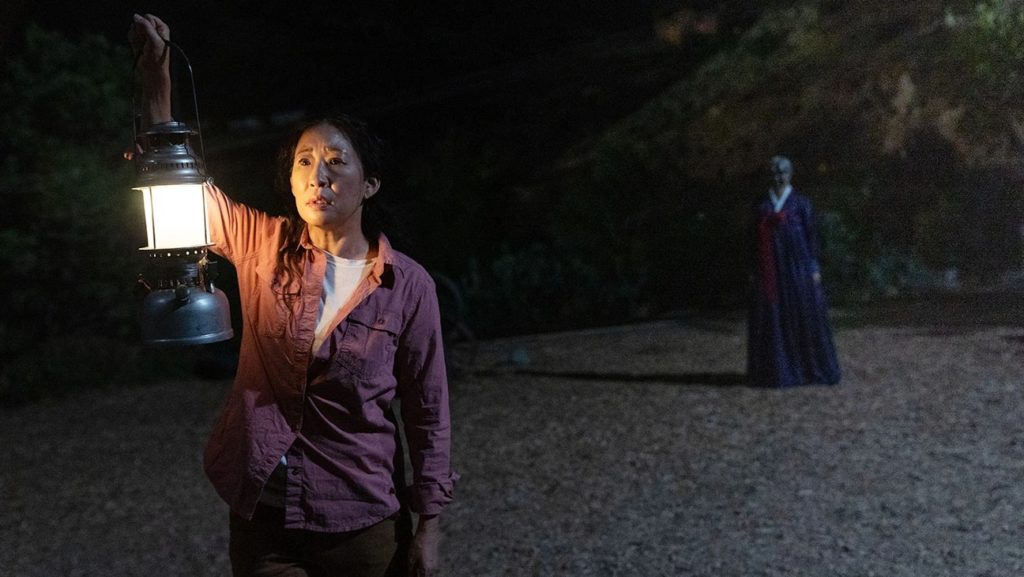Read also:
How to Watch FX Live Without CableHow To Watch AMC Without CableHow to Watch ABC Without CableHow to Watch Paramount Network Without CableFor a while, the Zainab Azizi & Sam Raimi-produced title is on par with its skillful lead
Sandra Oh has always had range, and her demonstration of it for viewers has always been spectacular. However, the feat she’s pulled this month will be tough to trounce. Oh has folks turning red one Friday and blanch white the next. And she pulls off the jaw-dropping swing in an on-screen mold as traditionally restrictive as “mother to a teenage daughter.” That said, whereas Mrs. Lee in Turning Red strives to adapt whenever possible, Amanda (Oh) in Umma refuses to.
Having fully cut technology from her life, explanations of “influencers” and “views” to Amanda have no meaning to her. It’s fine if her only gal pal is her daughter, Chrissy (Fivel Stewart). To beekeep and produce honey for the local grocer, Danny (Dermot Mulroney), is the only routine. Sure, there’s harshness in the household, especially when Chrissy’s perspective becomes central. Like Turning Red, though, it doesn’t reduce the characterization to tiger mom cliches. Like Domee Shi for her Pixar film, Iris K. Shim has given the trait some thought and background via direction and writing, rendering the quality as the lasting product of imperfect kinship instead of—yet again—a simple tool in the drama toolbox.
One day, Amanda’s uncle (Tom Yi) travels all the way from Korea to hand her the ashes of her mother (MeeWha Alana Lee). He also declares that there must be a proper burial, or the deceased matriarch will haunt the grounds as a gwisin, characterized in the film as a ghost wearing a dark purple hanbok and a dull-colored tal. Naturally, she is hesitant. For a proper procession, Amanda will have to fool herself into believing the sweetness around her today has no relation to the bitterness she had to endure in her youth. That someone else caused the burn scar on her hand, not Umma forcing her to grip an exposed electrical wire as hinted in the film’s opening. The resulting fear of lightning? Imaginary. The lashing sounds when she flips a switch on and off? Purely coincidental. That’s one too many non-truths for Amanda—or is it Soo-hyun?—with far too little time to process.
A strong choice in the pivotal Amanda-Uncle moment is that both actors speak Korean with their exchanges English-subtitled. Although not a must, it’s an elegant way for Umma to distinguish itself from most Western-produced and Western-based maternal hauntings, to let the horror be a culturally-rooted identity crisis. Doing so also twists insides in ways gotchas or shadowy glimpses can never do. The code-switching robs Amanda and viewers of a comfort zone. It gives context to an emotional barrier Amanda has purposefully built as “survival,” however damaging. It turns the roots you should be proud of into a thorny matter. It later rattles Chrissy when she applies for college. She’s seeing aspects of the world others, like the grocer’s niece River (Odeya Rush), already know.

The film’s notion of “possession,” as a result, has a refreshing tweak. Along with implying the gwisin’s ability, the “don’t become your mother” tagline suggests the antagonist is something a character grows into, not an external threat. That is happening to Amanda when her Umma arrives at last. If the paranoia and tension continue, Chrissy’s future self is her mother, at her most fractured. For someone growing up in a culture with the aphorism, “Cha mẹ đặt đâu con ngồi đấy” (literally “You sit where your parents have decided”), this is some soul-draining stuff.
Speaking of, Umma’s business of scaring operates in an interesting fashion. On the one hand, it shows an appreciation of the layers Shim has embedded into the story. A couple of notable set pieces use Leah Butler’s costumes to jolt (one weaponizes a hanbok, and another fleetingly morphs a meshed hat into a mourning veil). A couple challenges the rustic comforts of Yong Ok Lee’s sets with isolation and darkness. On the other hand, both design and execution falter the more things amp up. If it isn’t the unremarkable CGI (even when not extensively applied), it’s the choppier editing from Louis Cioffi and Kevin Greutert.
But through thick or thin, or whether Amanda is sane or slipping, Umma stays on track because of Oh. The film is watchable based on her performance as a scarred daughter, a mother with secrets, and a person insecure and lonely. Asking “Do you want to go to college?“ as if it’s an affront. Flinching when the suitcase of remains opens. That strong of a showcase warrants the desire for Shim to have made Umma more of a force. As it is, it provides scares with meaning that is less biting as it goes on, but ultimately is still an admirable entrance into the feature scene.
Umma is now playing in theaters.